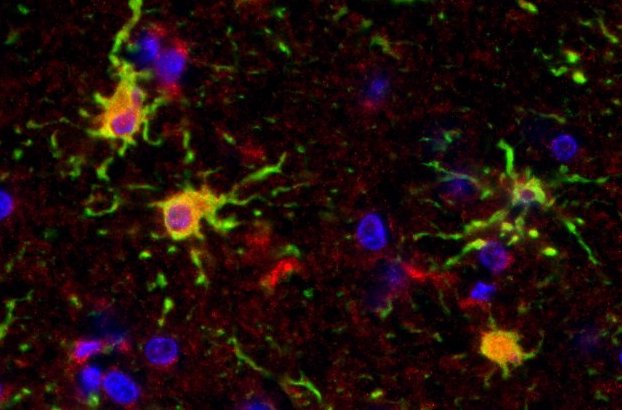(Tweeprint: 1/7)
ALS is a devastating neurodegenerative disease, but nobody knows its cause. Since astrocytes make a lot of diseases worse when they become reactive, we asked what would happen if we stopped astrocytes from becoming reactive in a mouse model of ALS...
ALS is a devastating neurodegenerative disease, but nobody knows its cause. Since astrocytes make a lot of diseases worse when they become reactive, we asked what would happen if we stopped astrocytes from becoming reactive in a mouse model of ALS...
(2/7)
Turns out, the mice live WAY longer - 50% longer! This is one of the longest extensions of lifespan reported in this mouse model.
So did we stop the disease from starting or did we slow its progression? (both would be cool!)
Turns out, the mice live WAY longer - 50% longer! This is one of the longest extensions of lifespan reported in this mouse model.
So did we stop the disease from starting or did we slow its progression? (both would be cool!)
(3/7)
We found that astrocytes are important for progression of the disease, not initiation. Astrocytes speed up degeneration and stopping them slows things down...
But most ALS patients don’t have a causative mutation, so is this astrocyte activation a general response?
We found that astrocytes are important for progression of the disease, not initiation. Astrocytes speed up degeneration and stopping them slows things down...
But most ALS patients don’t have a causative mutation, so is this astrocyte activation a general response?
(4/7)
We looked in human tissue and this astrocyte response happens in all ALS patients, including sporadic patients, so the mutations themselves aren't the reason astrocytes become reactive. To look at this further, we went back to the mouse model...
We looked in human tissue and this astrocyte response happens in all ALS patients, including sporadic patients, so the mutations themselves aren't the reason astrocytes become reactive. To look at this further, we went back to the mouse model...
(5/7)
...and looked at astrocytes and microglia from SOD1 mice. When there aren’t any other cells around to make them reactive, they actually look super similar to cells from normal mice! So it seems that it’s how the astrocytes respond to disease that matters…
...and looked at astrocytes and microglia from SOD1 mice. When there aren’t any other cells around to make them reactive, they actually look super similar to cells from normal mice! So it seems that it’s how the astrocytes respond to disease that matters…
(6/7)
This data is super exciting to us, most of all because it could lead to new therapies for ALS patients. Most patients come to the clinic after they get symptoms and most don’t have a known ALS mutation, so targeting astrocytes may be beneficial to a broad range of patients
This data is super exciting to us, most of all because it could lead to new therapies for ALS patients. Most patients come to the clinic after they get symptoms and most don’t have a known ALS mutation, so targeting astrocytes may be beneficial to a broad range of patients
(7/7)
Read the full paper here: https://rdcu.be/b5ROH
Data available here: http://www.gliaseq.com
Thanks to Maya Weigel, Julien Couthouis, Drew Adler, and @IVLRose. Support from @NIHFunding, @TargetALS_fdn, @CureAlzheimers, @StanfordBrain, @nyugrossman, and many not on Twitter
Read the full paper here: https://rdcu.be/b5ROH
Data available here: http://www.gliaseq.com
Thanks to Maya Weigel, Julien Couthouis, Drew Adler, and @IVLRose. Support from @NIHFunding, @TargetALS_fdn, @CureAlzheimers, @StanfordBrain, @nyugrossman, and many not on Twitter

 Read on Twitter
Read on Twitter


